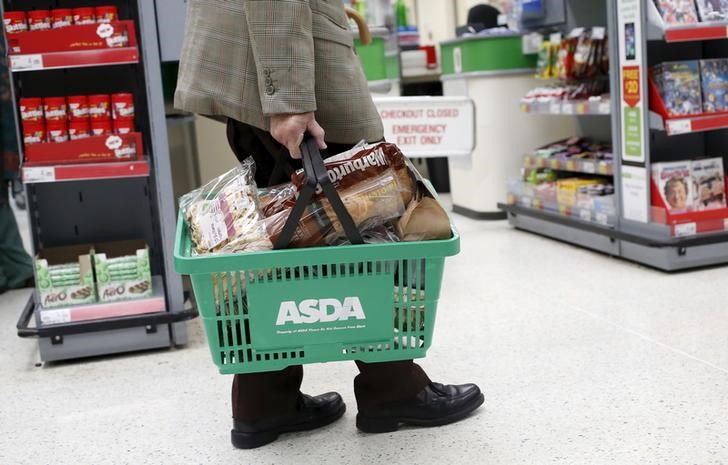By James Davey
LONDON (Reuters) - Industry sales figures underlined Asda's position as the weakest performer among Britain's largest supermarket groups on Tuesday, showing it remained under severe pressure from the growth of discounters Aldi and Lidl.
Germany's Aldi and Lidl notched up a combined 10 percent share of the British grocery market for the first time.
All of Britain's big four supermarkets -- market leader Tesco (L:TSCO), Asda, the British arm of Wal-Mart (N:WMT), Sainsbury's and Morrisons -- have been damaged by a price war, waged to try to stem the loss of shoppers to discounters, and by the impact of commodity-led deflation.
Market researcher Kantar Worldpanel said Asda's sales fell 3.5 percent in the 12 weeks to Nov. 8, with its market share falling 0.7 percentage points year-on-year to 16.4 percent.
Sales fell 2.5 percent and 1.7 percent at Tesco and Morrisons respectively. In contrast, sales at Aldi and Lidl soared 16.5 percent and 19.0 percent respectively.
"The discounters show no sign of stopping and with plans to open hundreds of stores between them, they'll noticeably widen their reach to the British population," said Kantar Worldpanel's Fraser McKevitt.
Analysts say Asda has particularly suffered because it has more overlap with Aldi and Lidl in its northern England heartland.
Some also see Asda as most vulnerable to improvements at Tesco and Morrisons, both of which have appointed new bosses to lead turnarounds.
"NADIR"
In August, Asda boss Andy Clarke described a 4.7 percent slump in second-quarter sales as the firm's "nadir" and talked of "green shoots" in the early weeks of its third quarter. However, industry data has indicated little improvement.
Asda's third quarter to Sept. 30 results will be reported later on Tuesday.
Though Asda's sales are falling it has not reported the profit declines and asset write-offs suffered by all its listed British rivals.
Last month, however, parent Wal-Mart did warn on profit blaming higher spend on wages and e-commerce and price cuts.
Clarke, the longest serving boss of Britain's major supermarket chains, launched a five-year strategy in 2013 focused on lower prices, while eschewing the money-off vouchers touted by its rivals.
Seeking to improve trading, Clarke refined that strategy last month, saying he would accelerate investment in larger stores and put expansion on hold elsewhere.
Last week Asda said it would not participate in the Nov. 27 "Black Friday" promotional day.
Kantar Worldpanel said sales growth in the overall UK grocery market was just 0.5 percent, held back by a 1.7 percent fall in prices over the period.
Of Britain's "big four" grocers, Sainsbury's has shown the most resilience to the discounters.
It sales rose 1.5 percent over the 12 weeks and it registered the first market share gain among any of the "big four" since October 2014, -- up 0.2 percentage points to 16.6 percent, regaining its status as Britain's number two supermarket.

"This is the fifth consecutive period of clear outperformance by Sainsbury's and this seems to have coincided with Tesco's trading form weakening," said analysts at Jefferies.